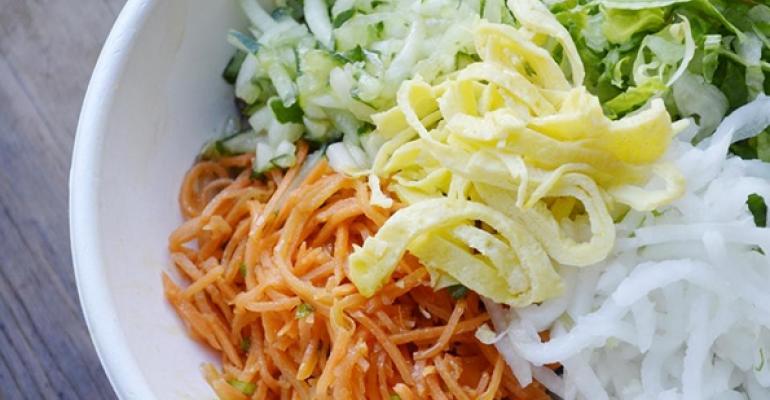Charley Shin, CEO of Gosh Enterprises, had been struggling for years to take the Charleys Philly Steak concept out of the malls where it had been known, and into more freestanding locations. So, one day in late 2012, when he was uncertain what to do, Shin got down on his knees and prayed.
Shin said that prayer yielded an answer: start a new concept. That idea ultimately resulted in the creation of Bibibop Asian Grill, a Korean-style fast-casual concept that serves made-to-order rice bowls, salads and rolls.
Bibibop has been an early hit. The first unit opened in 2013 in Columbus, Ohio, where Gosh Enterprises, parent to the Charleys Philly Steak chain, is based.
The company opened three more Bibibop locations in 2014 and has plans for another eight this year. If all goes well, it hopes to build a dozen in 2016, Shin said.
“Bibibop just came out of the blue,” he said. “One day late in 2012 I just kneeled down in my office at home and started seeking God, asking what I should do with this. After a few hours, I thought, ‘Gosh, I’m about to do a new concept.’ And it involved rice. I could not fathom selling rice at Charleys.”
But, for as much faith as Shin had in the idea, he went through a lot of preparation and development before getting the concept off the ground. He took three employees from Charleys and tasked them with helping to develop a fast-casual Asian-style chain.
They took a trip to Washington D.C., and visited several fast-casual concepts with different food styles, and ultimately settled on Korean. Shin is a Korea native whose family moved to the U.S. when he was 13. They took eight months to develop the concept, the recipes and find a site for the first unit.
“We visited five Chipotle-style restaurants that serve rice,” Shin said. “We didn’t know what we were going to do at the time. But after visiting all of those, it was a good experience. We knew this was the route, and the inspiration came a few days later.”
They ultimately created a flexible concept in which customers can order customized bowls, salads or rolls with a choice of base, either bean sprouts, black beans or sautéed potatoes, and proteins like chicken, steak or tofu. Sauces include Sriracha or Korean Red Sauce, along with toppings like various vegetables, cheese or egg. Extras include kimchi, a traditional Korean condiment, and miso soup.
The concept is positioned as healthful, promoting “well being,” Shin said.
While Charleys is a franchised concept, Bibibop will be largely company owned for now to establish an employee-friendly culture that promotes from within and pays higher wages.
“We really feel strong about the concept,” Shin said. “At its core, we take care of our employees and take care of our customers. We believe our employees are more important than any other aspect of the business.”
While Shin is working hard on Bibibop, the original sandwich concept is doing well, too, both through expansion and same-store sales growth — thanks to a rebranding in 2012.
That year, the company tested a new look to its stores that emphasized its cheesesteak sandwiches. It also went from offering two sizes of sandwich to three, the smallest being 7.5 inches.
“The results didn’t come out too well,” Shin said. “It was just a nominal sales increase. We were not sure the investment was worth it. But there was something in my gut at the time that told me it will pay off.”
The company made one minor tweak: It reduced the size of the small sandwich to six inches and lowered the price, along with implementing the rebranding systemwide. Customers could get a small chicken Philly and fries for $4.99.
Customers apparently loved it. Same-store sales last year in the U.S. rose 12 percent, Shin said.
“The six inch offers a better value,” he said. “That has become our most popular sandwich.”
Today, the company has 540 locations, including 70 in international markets. About 55 locations are expected to open this year, and the concept will continue to be a mall-based now that Shin is focused on Bibibop outside the confines of shopping centers.
As many as 45 of the new Charleys units this year will be in the U.S., the vast majority of them in malls, Shin said, though some locations will open in travel centers, airports and military bases.
He added that the company is adding few new franchisees, as existing operators snap up sites that become available.
“For Charleys, we’ve been doing the same thing over the past 20-plus years,” Shin said. “Our success is not anything new. We really had the core of business being quality, and freshness. I think the customer heeded that.”
Still, he said, customers are focused on fresh, made-to-order food at fast-casual type places. Shin believes both his concepts give customers what they want.
“Whether it’s Charleys or Bibibop, I really believe there’s one thing that makes businesses successful: Make customers happy,” he said. “I really preach that to our staff and restaurant crew. Just make customers happy. They’ll be back, and we’ll be happy.”
Contact Jonathan Maze at [email protected]
Follow him on Twitter at @jonathanmaze





